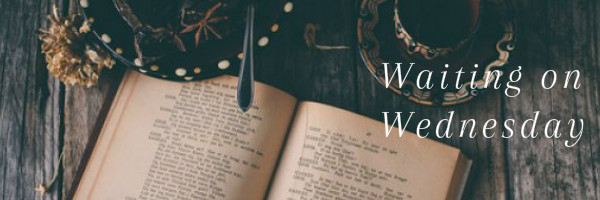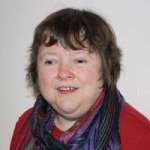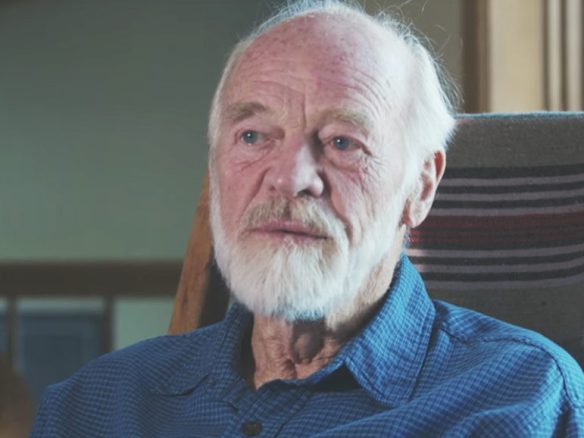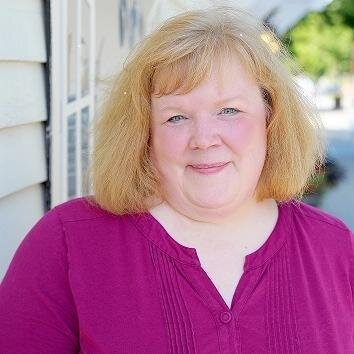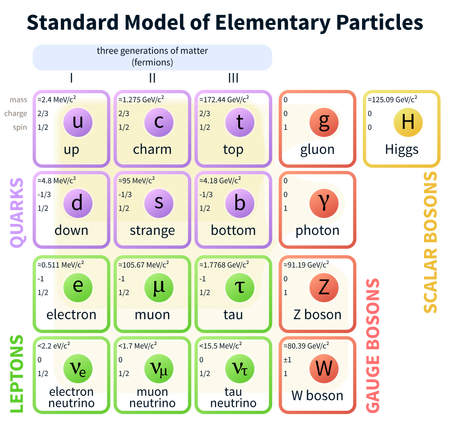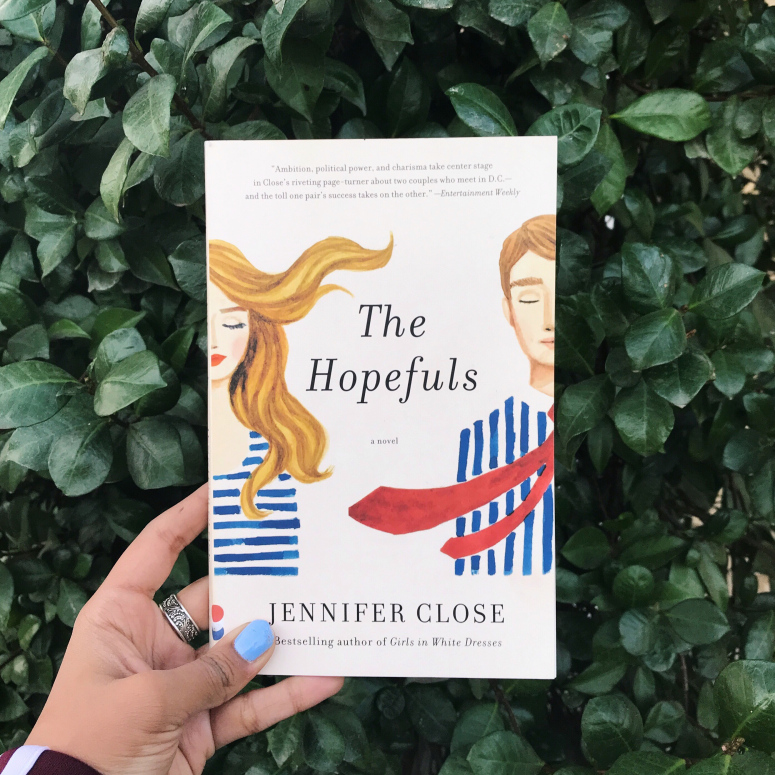Reviewed by Cecilia Cackley
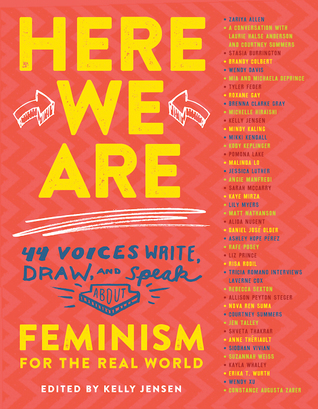 DESCRIPTION OF THE BOOK: Let’s get the feminist party started!
DESCRIPTION OF THE BOOK: Let’s get the feminist party started!
Here We Are is a scrapbook-style teen guide to understanding what it really means to be a feminist. It’s packed with essays, lists, poems, comics, and illustrations from a diverse range of voices, including TV, film, and pop-culture celebrities and public figures such as ballet dancer Michaela DePrince and her sister Mia, politician Wendy Davis, as well as popular YA authors like Nova Ren Suma, Malinda Lo, Brandy Colbert, Courtney Summers, and many more. Altogether, the book features more than forty-four pieces, with an eight-page insert of full-color illustrations.
Here We Are is a response to lively discussions about the true meaning of feminism on social media and across popular culture and is an invitation to one of the most important, life-changing, and exciting parties around.
MY TWO CENTS: This is an excellent, comprehensive look at feminism from many different perspectives. For the purposes of this book talk, I will be focusing on three essays in particular, but the whole book is a great balance of voices. By turns funny, serious, personal, or historical, it includes comics, lists, poetry, song lyrics, and interviews. This collection is the perfect book to hand to a teen who strongly identifies as a feminist, as well as the teen who is trying to figure out what it’s all about. In short, there is something for everyone here.
Three essays in particular are of interest to us here at Latinxs in Kid Lit (full disclosure, one is by my fellow blogger Ashley Hope Pérez) and they couldn’t be more different. “Pretty Enough” by Alida Nugent, is a personal story about growing up feeling out of place because of her Puerto Rican features and the change in her self-image after a trip to Puerto Rico. ‘The “Nice Girl” Feminist” by Ashley Hope Pérez is an amusing but incisive list of unspoken commandments for being a “nice girl” that really should be broken. And “Many Stories, Many Roads” by Daniel José Older is a stirring call to action and a testament to the truth that there are many different journeys to being a feminist.
Nugent’s description of her hometown in Westchester is amusing. “Antique shops, cider festivals and designer purses” are some points she includes on the list, along with high school friends who questioned her background (“Where are you from again?”) and pointed out her physical differences. It was a trip to Puerto Rico and her mother’s hometown that helped Nugent figure out that it wasn’t that she didn’t like her looks, but that she was tired of being the one person who stuck out. For teens growing up in similar situations where they feel out of place, Nugent holds out the promise that we can find somewhere to belong and be ourselves–whatever that looks like.
I laughed when I saw the title of Pérez’s piece. “Nice girl” is not a label I would have applied to myself as a teen. And yet, although I grew up in a much more liberal environment than Pérez, I was also one of those girls who didn’t understand the big deal about orgasms (like Pérez, I eventually figured it out). Not all teens are comfortable speaking loudly and challenging authority. One of the best things about Pérez’s piece is that she demonstrates how big injustices have their roots in small, everyday attitudes toward women and girls—attitudes that teens can absolutely challenge in small ways. In the end, Pérez writes, realizing you don’t have to conform to someone else’s expectations is a feminist act all by itself.
Older sets his essay in Barcelona and builds a strong setting, taking the reader along as he wanders through the city to the harbor. As he walks, he meditates both on the past he is processing (history, personal relationships, career experiences) and the future he is trying to figure out. Older makes clear that he considers art (specifically storytelling) to be essential to his activism and that being a feminist is a process, one that requires constant learning, unlearning and relearning. His prose is both reassuring and energizing at the same time, so that by the end of the essay, I felt ready to move forward, try again, and do better. You can’t ask for more from a book for young people.
TEACHING TIPS: Many of the selections here would be great to assign and discuss in a high school class on history, sociology, or psychology. My 16-year-old brother is currently in the middle of a gender inequality unit in his AP English class, and he is using this book to fulfill an independent reading assignment. Nova Ren Suma’s piece about gender inequality in school reading lists is a great choice to start a discussion about curriculum, canon, and the choices made by teachers and professors.
The short length of the selections and incorporation of lists, photos, and questionnaires make this a great book to recommend to teens who are interested in the subject, but not ready to tackle something lengthy by bell hooks or Simone de Beauvoir. Many of the contributors, such as Kody Keplinger, Brandy Colbert, Malinda Lo, Nova Ren Suma and Erika Wurth have other published work that readers can seek out and read as well. The piece by Wendy Davis would be an excellent choice for a government or civics class when talking about women in politics and schools reading Michaela DePrince’s autobiography can use her essay to further their knowledge about her life and art.
 ABOUT THE EDITOR: Kelly Jensen is a former teen librarian who worked in several public libraries before pursuing a full-time career in writing and editing. Her current position is with Book Riot, the largest independent book website in North America, where she focuses on talking about young adult literature in all of its manifestations. Her writing has been featured on The Huffington Post, at Rookie Magazine, The Horn Book, BlogHer, School Library Journal. She contributed an essay and a guide to teen sexuality in pop culture for Amber J. Keyser’s The V-Word: True Stories of First-Time Sex and is the author of the book It Happens: A Guide to Contemporary Realistic Fiction for the YA Reader from VOYA Press.
ABOUT THE EDITOR: Kelly Jensen is a former teen librarian who worked in several public libraries before pursuing a full-time career in writing and editing. Her current position is with Book Riot, the largest independent book website in North America, where she focuses on talking about young adult literature in all of its manifestations. Her writing has been featured on The Huffington Post, at Rookie Magazine, The Horn Book, BlogHer, School Library Journal. She contributed an essay and a guide to teen sexuality in pop culture for Amber J. Keyser’s The V-Word: True Stories of First-Time Sex and is the author of the book It Happens: A Guide to Contemporary Realistic Fiction for the YA Reader from VOYA Press.
OTHER LINKS:
Interview with Daniel José Older:
http://www.teenlibrariantoolbox.com/2017/01/feminism-is-for-everyone-here-we-are-editor-kelly-jensen-interviews-contributor-daniel-jose-older/
Interview with Alida Nugent:
http://www.teenlibrariantoolbox.com/2017/01/here-we-are-feminism-for-the-real-world-kelly-jensen-talks-with-contributor-alida-nugent-about-social-justice-feminism-finding-and-using-your-voice/
 ABOUT THE REVIEWER: Cecilia Cackley is a performing artist and children’s bookseller based in Washington, DC, where she creates puppet theater for adults and teaches playwriting and creative drama to children. Her bilingual children’s plays have been produced by GALA Hispanic Theatre and her interests in bilingual education, literacy, and immigrant advocacy all tend to find their way into her theatrical work. You can find more of her work at www.witsendpuppets.com.
ABOUT THE REVIEWER: Cecilia Cackley is a performing artist and children’s bookseller based in Washington, DC, where she creates puppet theater for adults and teaches playwriting and creative drama to children. Her bilingual children’s plays have been produced by GALA Hispanic Theatre and her interests in bilingual education, literacy, and immigrant advocacy all tend to find their way into her theatrical work. You can find more of her work at www.witsendpuppets.com.
- Share
